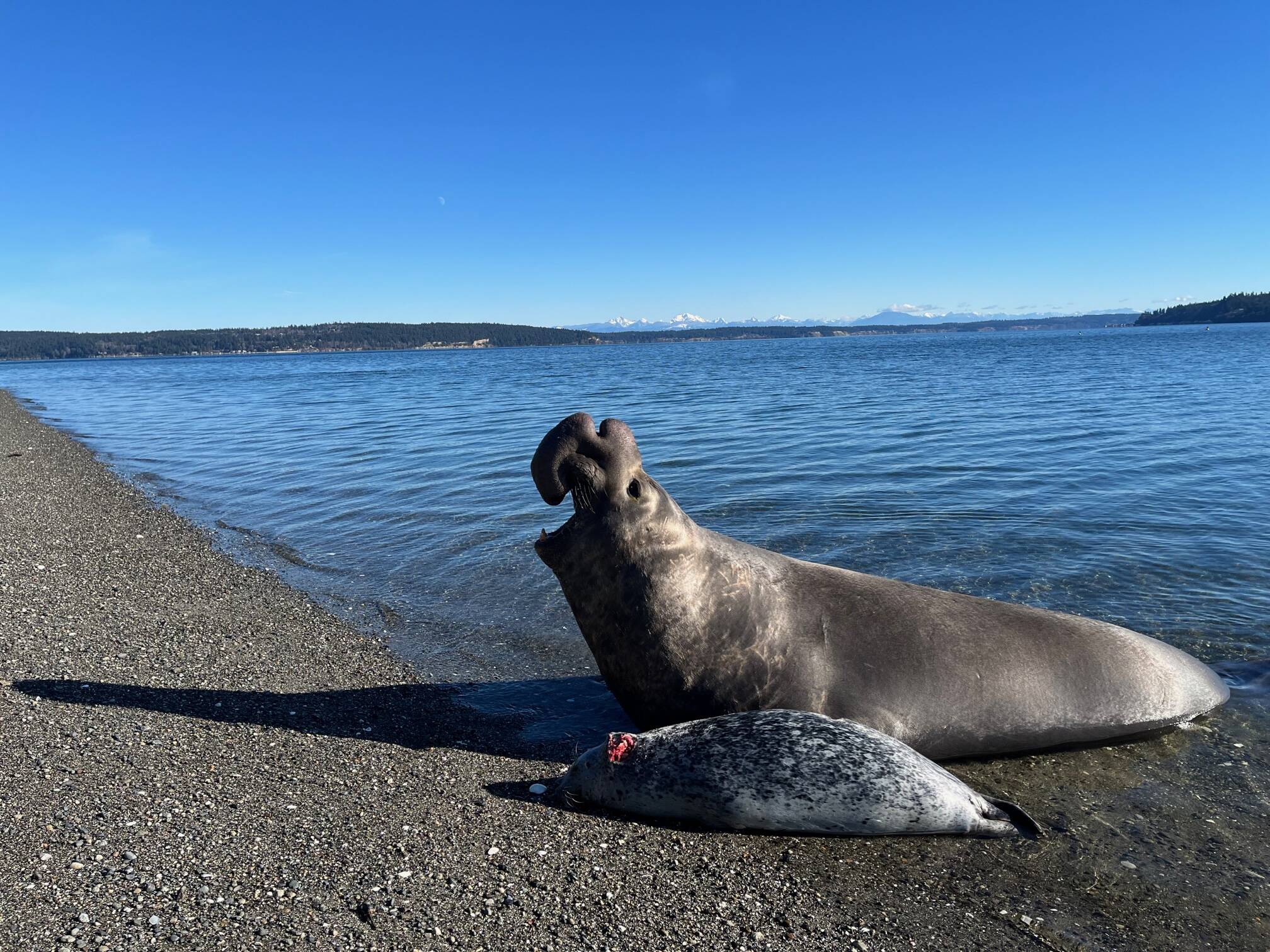Ellison the elephant seal was in a bad mood Monday.
The 2,000-pound pinniped attracted a few curious neighbors to a Central Whidbey beach, where he had dragged a harbor seal ashore after killing it. Jan Skewes snapped some photos of the behemoth looming next to the smaller seal body at the water’s edge. She said he threw his head back and roared triumphantly, exposing his formidable teeth.
While she was thrilled to see the dramatic scene with the rare giant, she said she was careful not to get too close to him. He seemed like a “big lazy guy” but obviously has a cranky side.
“He looked at us with attitude, like he was saying, ‘I’m tired, get the hell away from me, leave me alone,’” she said with a laugh.
Garry Heinrich, a volunteer coordinator for Central Puget Sound Marine Mammal Stranding Network, said people are right to give Ellison a wide berth. Elephant seals may have Jabba-the-Hut-like bodies, but they are deceptively speedy on land. Plus Ellison — like other males of the species — has a naturally aggressive nature.
Elephant seals don’t eat other seals, Heinrich explained, but they aren’t exactly on friendly terms. Ellison is known to have killed harbor seals before.
“The seals get in his way, or just annoy him, and he goes after them,” Heinrich said, adding that battles between adult males vying over a “harem” are often violent and gory.
At 7 years old, Ellison hasn’t fathered any pups yet and is still growing. He will add at least another 1,000 pounds by the time he is full grown, Heinrich said. A good rule of thumb for those who come upon an elephant seal, he said, is that you are too close if it’s looking at you.
Ellison is one member of a small family that regularly returns to Whidbey Island, though he may be the least well-known. Ellie, the matriarch of the family, first ventured to the island in 2010 to molt. She returned to the area several times over the years and gave birth to her first of four pups in 2015.
Ellison’s brother, Elwood, made headlines in April 2021. Elwood, then a 200-pound 6-week-old, got stuck in a storm drain and had to be rescued by South Whidbey firefighters.
A year ago, Ellie’s daughter, Elsie Mae, gave birth to a pup named Emerson at Bowman Bay at Deception Pass State Park. Photos of the large, wrinkly-skin baby appeared in newspaper and TV news across the region. The section of the park was closed down to give mother and son a safe, quiet place to hang out during the early weeks.
Unfortunately, the mom eventually left on her own but the baby didn’t. Heinrich said NOAA officials were concerned that Emerson would imprint on people and pose a risk to kayakers and other visitors, or vice versa. As a result, they moved the young elephant seal northward to an area that has more of his own kind. While he was tagged, officials aren’t certain about his current location.
Much is still unknown about northern elephant seals, which Heinrich described as “fascinating creatures.” They range from Mexico to Alaska; most stay on the coast, but small numbers venture into Puget Sound for a few months each year, according to NOAA. Elephant seals spend most of their lives in water around the continental shelf, where they dive thousands of feet deep to eat squid, bottom-feeding fish and the occasional mollusk, Heinrich explained.
Unlike other seals and sea lions, elephant seals don’t normally go after salmon and so don’t pose a risk to the endangered salmon that southern resident orcas depend on.
Scientists don’t completely understand why the small number of elephant seals have fidelity to Whidbey Island; Ellison can often be found on Baby Island, which is off the east side of Greenbank.
Sightings of the giants remain unusual and exciting occasions. Skewes said a neighbor alerted her to the seal Monday afternoon and warned her to keep her dogs home. She and a couple of neighbors went down to the beach and watched Ellison for about half an hour.
It wasn’t the first time Skewes has had encounters with marine mammals near her North Bluff Road home. She’s seen harbor seal pups on the shore as well as sea lions, which bark at her dogs. One time she prevented a wayward sea lion from “scooting” up the hill to the houses above, where it would have inevitably gotten into trouble. She said the animal seemed bent on the exodus, so she and a friend used a bench as a mobile barrier to change its mind.
“I was able to put my experience with herding dogs to use,” she said.



